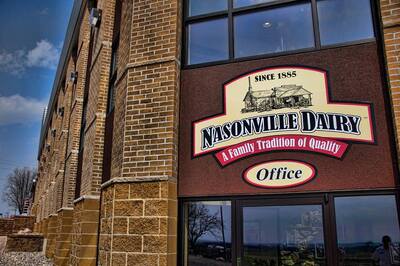Nasonville Dairy Provides High Quality Milk for Local School Children
Friday, November 3rd, 2023 -- 1:00 PM

(Danielle Nauman, Dairy Star) Being in the business of producing, processing and marketing dairy products, it is a good business practice for dairy farmers to create consumers of those products while those consumers are young.
According to Danielle Nauman with the Dairy Start, Ken and Joellen Heiman operate a trio of dairy-related businesses: Heiman’s Holsteins, where they milk 500 cows and focus on breeding for A2A2 milk; Nasonville Dairy, an award-winning cheese plant; and Weber’s Farm Store, a retail store location where they also process fluid milk and make a variety of other award-winning dairy products.
All three entities are located in Wood County, in or near Marshfield. The Heimans each grew up in their respective family dairy businesses, Ken’s family has a long history with Nasonville Dairy, and Joellen’s family established Weber’s Farm Store when she was a child, so creating each generation of milk consumers is something near and dear to their hearts, they said.
The Heimans are concerned with the palatability of milk served in schools. “We need to be able to get back to serving at least 2% milk in the schools,” Ken said. “With the milk schoolchildren get, we have taken all the flavor out. There really is no comparison in the taste of 2% milk versus the taste of 1%. … If you compare the difference between that and whole milk, which is just 3%, it is phenomenal.”
The Heimans are concerned that the lack of flavor, along with unappealing packaging in cartons, has deterred children from becoming not only consumers of milk, but lovers of milk. Setting out to solve what they see as a problem, the Heimans worked to provide appealing milk to local schools.
Today they are providing milk to over 11,000 children attending 16 central Wisconsin schools. The milk the Heimans are delivering to the schools, both white and chocolate, is packaged in 8-ounce plastic pouches, into which the children are able to easily insert a small straw.
The Heimans have been packaging milk in half-gallon pouches for over 50 years, and they believe the pouches are ideal packaging for school-aged children. “The kids love them; they have no trouble using them,” Joellen said. “They are like the little juice packets parents buy for kids.” From an environmental standpoint, the pouches are a benefit as well.
“We’ve reduced the amount of garbage produced by 80%,” Ken said, adding that the use of biodegradable plastic, made from corn, is an option, but that would increase the price-point of each pouch of milk.
The individual pouches are labeled with plant codes and dates, with the traditional packaging labels containing the nutritional information placed on the outside of each crate of milk. The Heimans offer eight-packs of 8-ounce chocolate milk pouches in their store for retail sale.
“We produce four different white milks, whole, 2%, 1% and skim, so it’s kind of hard to have that stocked in the 8-ounce sizes,” Joellen said. “But if people want, they can special order 8-ounce white milk pouches from the store.”
Packaging milk for schools is not completely uncharted territory for the Heimans. Prior to the Obama administration school lunch initiatives, they packaged milk for several local schools.
“When that initiative came down, (schools) needed to switch to 1% milk, and we did not have that labeling at that time,” Joellen said. “We had to discontinue providing that service.” While the Heimans have been processing milk in packaging for school consumption, they continually are looking to streamline the process.
“From our side of it, we had some major investments to make,” Ken said. “One thing we needed to do was to purchase another (pouch packaging machine) because we wanted to decrease our processing timeline. Also, we can’t afford any downtime.”
Ordering a new pouch packaging machine was not an easy task, Ken said. When they purchased their first machine, it was made in Canada. Since that time, the design patent was sold to a European company, requiring them to order the machine from Europe and have it shipped back to Canada before bringing it to their location.
As the Heimans continue to make the investments in their businesses, they hope to bring their milk to more area schools. “All the milk we are providing to the schools is A2A2 milk, which has a more easily digested protein,” Ken said.
Making milk easily digestible for the youngest consumers is a priority for the Heimans. Ken said they are working at removing half the lactose from milk through ultra-filtration and then converting the remaining lactose to glucose and galactose, keeping the flavor profile identical to milk that has not been converted.
“That will virtually eliminate any issue with lactose intolerance,” Ken said. “It should be that there is less than one-half of 1% of people who can’t handle lactose. That would be normal. Right now, we are looking at nearly 30% of people who think they are lactose intolerant.”
Along with the taste and packaging issues, the Heimans are frustrated with the U.S. Department of Agriculture’s regulations regarding labeling of milk and the way milk is perceived by the general public.
“People don’t understand that whole milk is really 97% fat-free, but we are restricted by the USDA from labeling it that way,” Ken said. “Milk is such a healthy, low-fat product naturally. Why do we need to alter it to such an unappealing state to meet these nutritional guidelines they impose? These are things that should be left up to local school boards to oversee.”
Feel free to contact us with questions and/or comments.




